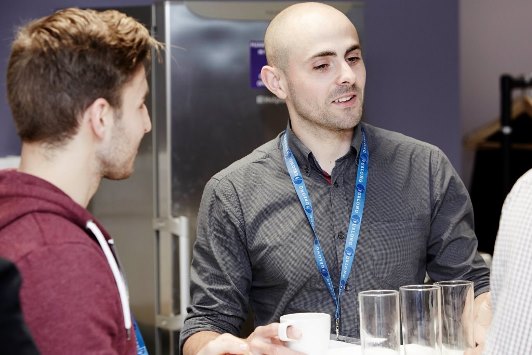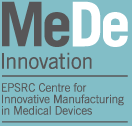Day in the life: Miquel Gimeno-Fabra – networking for opportunities

September 15, 2014
The ‘Day in the Life’ series of blog posts gives an insight into some of the people and roles that support the delivery of the MeDe Innovation research challenges.
The second ‘day in the life’ post comes from Dr Miquel Gimeno-Fabra, a Post-Doctoral Research Fellow at the University of Nottingham.
I heard a quote recently, ‘a simple hello could lead to a million things’. At this point in my career the phrase seems representative of some of the soft skills that are necessary to understand in order to progress.
I am a Chemist, starting my Degree in 2005 near Barcelona. I came to the UK – Nottingham Trent – in 2007 as part of the ERASMUS programme. After a few weeks into the programme I was offered the opportunity to complete my Masters in the UK with an integrated MChem (the British qualification rather than Spanish). Initially I came to the UK for the experience of working and studying in a different country, so the opportunity was an exciting bonus.
During my Masters I carried out an internship in Switzerland, which was my first contact with the world of biomaterials – bioresorbable gels and other similar materials. The experience was fantastic as they had facilities and regulations that allowed us to test ideas out pre-clinically straight away. It also served me to make many good friends with which I now collaborate and with whom I have published.
Although I am a Chemist, I was always very motivated to move into Engineering, where I could work in something more applied.
The University of Nottingham was offering a PhD position with a professor that I liked –a young entrepreneur with a spin out company– in chemical engineering and materials science. I was awarded a place and started study towards a PhD in continuous synthesis of nano-materials. This was partially funded by a company who had developed a reactor which had the potential to generate all sorts of nano-materials given the right formulation of the precursors. The main aim of my PhD was to push the limits of application of this type of reactor, so I had loads of freedom to research what I wanted and was not short of opportunities to collaborate with colleagues of my supervisor.
I focussed on different kinds of materials but the ones that have ended up having significant success both academically and industrially were metal organic frameworks for hydrogen storage and CO2 capture, and especially nano-ceramics for body armour applications. Apart from several publications, what is most exciting to me is that now some of these products are being considered by companies and investors to be further tested and commercialised.
My PhD co-supervisor Professor David Grant mentioned the MeDe Innovation PDRA position as it linked all my interests and expertise. At Nottingham, the MeDe project includes a wide variety of processes, especially the design and production of glass fibre/polymer composites for resorbable implants, the generation of thin films using plasma and even the use of nanomaterials for biomedical applications –all fields that match my interests and expertise. The ability of having lots of different projects at once is great, as it gives me wings, it means that I can work on many topics and keep thinking out of the box.
Building a career with academic and industrial aspirations
I’m hoping to build a career in academia here in Nottingham. Although I am very interested in the application side of everything we research, I think that the freedom and experimental nature of working in academia appeals more to me than working in industry, where it is likely to be very production/results-driven. I believe that if you are the type of person that gets far too involved in what you do, you might as well focus your energy and time in academia.
The opportunity to teach is really attractive too. I think very specific, emerging areas like nano-materials and their uses are hard to learn, so to transfer some of these expertise through lecturing could be very rewarding. It is also a hot and relatively new topic, so I think that as an early stage career researcher in the area I would fit well with a lecturing position.
With my experience in the field of engineering and research, I understand how important keeping close links with industry is, and I’m keen to keep building bridges to allow me to bring funding from companies. To me, none of our projects would be worthwhile unless we had industry partners that intend to scale-up and use the knowledge that we create for a real world application. I think that technology transfer between industry and academia is, and will be, key for our social and economical evolution.
Networking to find new opportunities
Being part of the EPSRC Centre for Innovative Manufacturing in Medical Devices (MeDe Innovation) has given me opportunities to meet other professionals that share similar challenges to me, and that are also keen on opening collaborations.
The MeDe Innovation launch event was a clear example of successful networking. I met a surgeon and an industry representative there and found we had some interests in common. In short, without even knowing the surgeon was using these type of materials which the industry rep was making, they both saw deficiencies which here at Nottingham we believe we can correct. Since then we have met, written and submitted a few proposals together. By just talking to people and finding out what they do you can quickly start working together. It’s been particularly helpful getting to know a clinician as they can offer so much in terms of suggestions and solutions, and ultimately they’re the end user of the work I’m doing.
Miquel’s top three tips for effective networking:
- Dress appropriately and professionally – first impressions are important, and, if you’re keen to make connections with professionals, it’s important to show you have the same values as they do.
- Be prepared – have some business cards and a solid understanding about what you do. Some literature -or even photos of samples on your phone!- also helps to explain some of the more complex aspects of your work. Remember that sometimes a picture is worth a thousand words.
- Learn to listen – you might not necessarily have to talk lots about yourself but ask questions and then listen to answers instead. I often learn something new and find some areas of common interest for the future. Don’t try and impress them by going into detail on your research, chances are you are only boring them!
